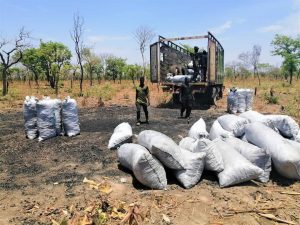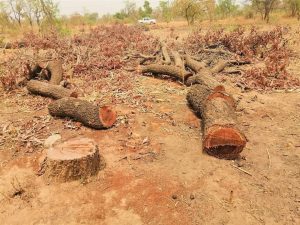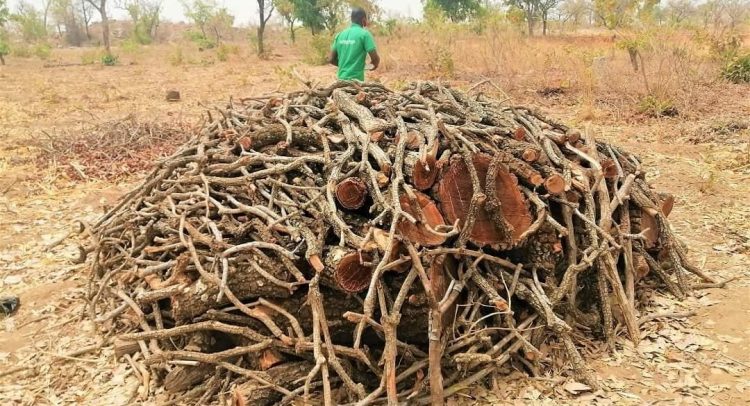The destruction and burning of Shea trees scientifically called the Stellaria paradox are endangering the livelihood of hundreds of women in the Northern Region of Ghana.
Shea trees also know as the Northern ‘cocoa’ is the main source of income generation for the majority of local women.
The Shea trees and their products provide a vital source of income and food for the rural dwellers. It helps to protect and restore the environment, allowing communities to grow their way out of poverty and build their climate change resilience.
The economic development of Ghana is partly hinged on the contribution of the women in Shea activities, collectors and processors and the implementation of various policies that invest in the environment to ensure the sustainable production of Shea would help to salvage the plight of rural dwellers.
The Shea tree is an indigenous asset in West and Central Africa and also abundant in the Savannah ecological zone but the continuous felling of the economic Shea trees, described as illegal is detrimental to the environment and adversely impacts the economic activities of rural women.

The Shea fruit is a great source of nutrients for people in rural Africa that often have limited food sources, while the Shea nut can be processed into butter which can be used for cooking or to make cosmetics which are used all over the world.
In addition, Shea trees help to stabilize the environment and build resilience against the climate change crisis. Currently, in West Africa, Shea trees absorb and fix an incredible about 1.5 million tonnes of CO2 every year.
According to the Global Shea Alliance(GSA), a non-profit industry association, almost eight (8) million Shea trees are lost across West Africa every single year. The impacts of the climate crisis along with unsustainable tree use and increased clearing of land for agriculture are all major contributors to the alarming decrease in the Shea population.

Research by the GSA in 2020 revealed the Shea trees’ economic value, as Ghana earns more than US$32million annually from the exportation of Shea products.
Without these amazing trees, many communities would lose this essential source of food and income and the environment would suffer dramatically which has motivated TREE AID, an international development organization that focuses on unlocking the potential of trees to reduce poverty and protect the environment in Africa to support communities to protect their Shea trees.
An estimated three million rural women in Ghana, especially the Savannah Ecological Zone make a small income from Shea butter.
To enhance climate change and the livelihood of the rural dwellers especially women, An initiative to plant 10 million Shea trees over the next 10 years, replacing felled and aged trees has been unveiled by the GSA.
The project in collaboration with Action for Shea Parklands (AFP), and seeks to achieve the set goals by planting, protecting, and promoting Shea parklands across West Africa. To this end, some 34,000 seedlings were planted to replace the aged economic Shea trees.
The burning of the Shea trees to produce charcoal has been a source of employment for most women in the Northern part of Ghana as a means for survival.
The women aside from extracting oil from the Shea butter also sell the nuts as a form of income generation.
The shea tree is being cut and used as firewood for domestic and economic purposes by some people in the Savannah ecological zone for their selfish gains.
A charcoal dealer, Faustina Akabu tells DGN Online that the cutting of Shea trees and burning of charcoal is her only source of livelihood.
“ This is the work we also do to take care of our children and so the ban on charcoal burning has affected us greatly,” she lamented.
According to her, most of them took loans from the bank for the business and that if they are being stopped from the charcoal business it will be difficult for them to retrieve the money they have invested since they still have lots of bags of charcoal and in the forest.
“We will plead that they allow us to retrieve all of the bags of charcoal in the forest to be able to pay back the loans we took else it will be difficult for us to pay back the loan.”
She however appealed to the government to find other alternative for them since the cutting of Shea trees and burning of charcoal is their livelihood.
*Savannah Regional House of Chiefs Intervention*
The Central Gonja District where the charcoal selling business is booming has been tagged as the ‘ charcoal market’ in the Savannah ecological zone.
Following that the paramount chief of the Buipe Traditional Area who doubles as the Vice President of the Savannah Regional House of Chiefs, Buipewura Abdulai Jinapor Il, ordered the closure of the Buipe charcoal market in the Central Gonja district of the Savannah region.
“I declare to the people of the Central Gonja District and Ghana at large that the Buipe charcoal park popularly known as ‘Birdie Park’ has been closed and banned from its usual activities.”
The Buipewura made this known at a Central Gonja district stakeholder consultative dialogue meeting on illegal logging, commercial charcoal burning and commercial fuelwood activities affecting the environment.
The closure of the charcoal follows the ban of illegal logging, commercial charcoal burning, and commercial fuelwood activities by the Regional House of Chiefs in the region.
All chiefs in the Savannah region have been tasked to as a matter of urgency form a task force in their jurisdictions to support the ban to achieve its set goals and report the same to the Regional House of Chiefs.
*Governments Intervention*
The government of Ghana has initiated a Green Ghana Project scheduled to take place on June 11, 2021, and will plant five million (5,000,000) economic trees in a day, across the country.
The Green Ghana Project seeks to mobilize citizens to plant trees, nurture them to maturity and contribute to the preservation of the country’s environment.
*SDG*
The Sustainable Development Goal 13 which Ghana has signed onto talks about taking urgent action to combat climate change and its impacts.
Given that, improving the livelihoods of the Shea communities, women collectors, and processors would help curb the unemployment rates and also encourage more women and youth to venture into the sector.
Also, the amendment of the Economic Plants Protection Act, to include Shea would help prevent the destruction of the economic Shea trees for illegal charcoal production and logging; as well as their destruction by the government to make room for developmental projects and infrastructure.
FROM Eric Kombat


